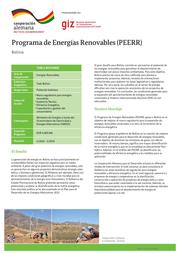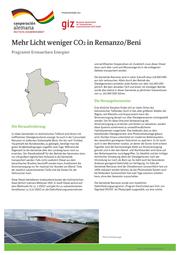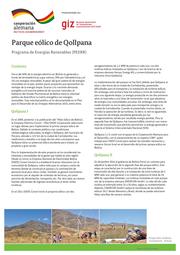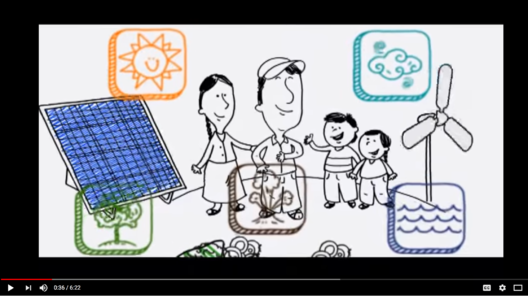Difference between revisions of "Renewable Energies in Bolivia"
***** (***** | *****) m (→News) |
***** (***** | *****) m (→Introduction) |
||
| Line 1: | Line 1: | ||
[[File:PEERR-Largo.jpg|border|800px|alt=PEERR-Largo.jpg]]<br/> | [[File:PEERR-Largo.jpg|border|800px|alt=PEERR-Largo.jpg]]<br/> | ||
| + | |||
= '''Introduction'''<br/> = | = '''Introduction'''<br/> = | ||
| − | < | + | Bolivia produces nearly 60 per cent of its energy through the burning of fossil fuels – with the corresponding negative impacts on the climate. Despite the enormous available potential, the country only uses solar, wind, biomass and geothermal energy in a few demonstration projects. The Andean highlands are among the world’s best locations for harnessing solar energy. The Government of Bolivia intends to utilise this potential and thereby diversify its energy production, a goal that it has documented in the Alternative Energy Development Plan 2025. |
| + | |||
| + | The use of renewable energies, which guarantee both security of supply and environmental sustainability, is a major challenge for Bolivia. Staff in the responsible institutions lack the expertise needed to create the legal framework and to plan and implement concrete projects. Energy supply continues to be heavily subsidised by the state, impeding the operation of power stations that use renewable energy on a cost-effective basis.<ref>1. Expanding de use of renewable energy</ref> | ||
| + | |||
= '''Projects in Bolivia''' = | = '''Projects in Bolivia''' = | ||
Revision as of 22:37, 15 September 2017
Introduction
Bolivia produces nearly 60 per cent of its energy through the burning of fossil fuels – with the corresponding negative impacts on the climate. Despite the enormous available potential, the country only uses solar, wind, biomass and geothermal energy in a few demonstration projects. The Andean highlands are among the world’s best locations for harnessing solar energy. The Government of Bolivia intends to utilise this potential and thereby diversify its energy production, a goal that it has documented in the Alternative Energy Development Plan 2025.
The use of renewable energies, which guarantee both security of supply and environmental sustainability, is a major challenge for Bolivia. Staff in the responsible institutions lack the expertise needed to create the legal framework and to plan and implement concrete projects. Energy supply continues to be heavily subsidised by the state, impeding the operation of power stations that use renewable energy on a cost-effective basis.[1]
Projects in Bolivia
Qollpana's wind farm
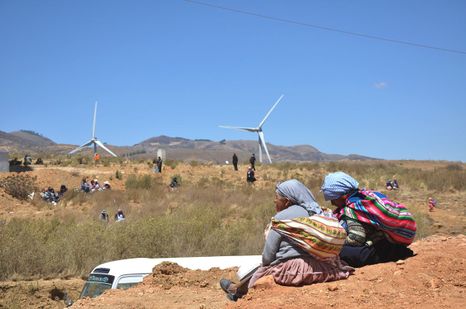 |
In 2009, Qollpana was selected as an ideal place to implement Bolivia's first wind park. Qollpana is located in the municipality of Pocona, 122 km from Cochambamba city. Studies over three years concluded that Qollpana has excellent wind potential to set up a large-scale project. This wind farm was implemented by the National Electricity Company Bolivia (ENDE) Corani and had tecnichal assitance by GIZ. The planning and construction of Qollpana's wind farm is divided in two phases: Qollpana I and II. For more information click here. |
"El Espino" Photovoltaic/Diesel park
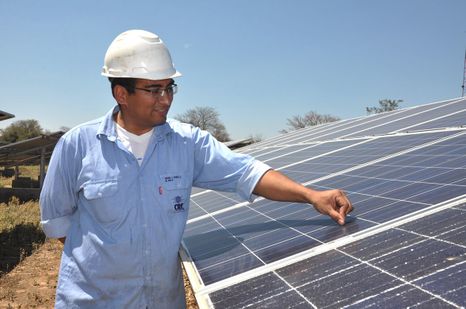 |
FV/Diesel
|
Publications
Factsheets
|
Renewable Energies Programme (PEERR) presentation. Description of the challanges, aims and actual situation. Click here for German Version. |
Remanzo Photovoltaic Park Description, planning and advances of the photovoltaic park in Remanzo - Beni, Bolivia. Only German Version. |
Qollpana's Wind Park (Bolivia) Description of the implmentation of the first bolivian wind park in Cochabamba region. Only Spanish Version. |
|
Urban lighting with LED technology (Bolivia). DeveloPPP project with PFM company. Only Spanish Version. |
Videos
See a brief explanation of Alternative Energies in Bolivia. To see the video click here.
Video was made by EnDev Bolivia - GIZ with the Ministerio de Hidrocarburos y Energía
Video of Climate Change in Bolivia (Klimawandel - versión alemán - versión español).
News
• 2017-19-15 Alternative energy contributes 3% to Bolivia's electricity system (La Razón). Link
Renewable Energies Programme (PEERR) - GIZ
Since May 2016, the Renewable Energies Programme (PEERR) supports Bolivia improving the regulatory framework for the renewable energies expansion in electricity grid-connections and increasing energy efficiency.
The Program supports Bolivian government in creating better conditions for the renewable energy development, in order to reduce the greenhouse gas emissions as our aim. At the same time, it means a greater diversification of the energy matrix, which in the present is basically fossil - hydro. In addition, within the scope of the Programme, the potential of energy efficiency and its application activities will be identified.
The Program have different intervention levels: at the national level, PEERR will consult the Government about renewable energies regulations and energy efficiency and at the regional level, the programme will advise energy companies and cooperatives in the planning, building and operation of wind and solar photovoltaic projects that are connected to the national grid. In addition, PEERR will also give technical advice on hybrid photovoltaic/diesel systems for people that are far from the grid connection.
In the academic area, the Program will support institutions for training in demand topics, making the educational subjects and the introduction of practical training. Germany has a lot of experience in the field of renewable energies, energy efficiency, technological know-how; which allow us to develop innovative application ideas that may be useful for Bolivia.
For more information: Factsheet PEERR (Spanish version, German version).
Areas
Energy regulation framework
Technical Assistance
Energy Efficiency
Training
- ↑ 1. Expanding de use of renewable energy


